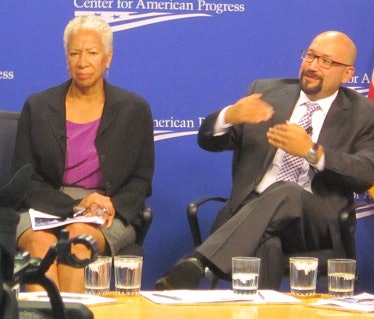 Angela Glover Blackwell, president and CEO of PolicyLink, and Dr. Adrian Pantoja, senior analyst at Latino Decisions opinion research organization. (photo by Ronald Roach)
Angela Glover Blackwell, president and CEO of PolicyLink, and Dr. Adrian Pantoja, senior analyst at Latino Decisions opinion research organization. (photo by Ronald Roach)WASHINGTON – In recent years, Americans have been told that U.S. racial and ethnic diversity will be increasing to the point that by mid-century the nation will cease to have a White majority within the population.
For many, the perception of that milestone has been reached or has been nearly attained. A new survey released by the Center for American Progress (CAP) and the PolicyLink organization indicates that many Americans already believe non-Whites are the majority of the U.S. population.
With minorities currently making up 37 percent of the U.S. population, Americans on average believe that non-Whites are 49 percent of the U.S., according to the “Building an All-In Nation: A View from the American Public” survey report. Released on Tuesday, the survey notes that the tendency of respondents to overestimate the minority population demonstrates “that Americans are not in denial about the high and rising levels of diversity” in American society.
“According to the American people, we are already or almost a majority-minority nation, which is interesting,” said Dr. Ruy Teixeira, a senior fellow at the Center for American Progress, during a CAP forum on the survey’s release.
“What we found out is that [Americans] not only know that diversity is happening, [but] they tend to overestimate the percentage of minorities in our population by quite a bit,” noted Teixeira, one of the survey’s co-authors.
African-Americans on average estimated that non-Whites are 53 percent of the population followed by Latinos, who estimated an average of 50 percent, and then Whites, who estimated an average of 48 percent. Asian-Americans provided the most accurate estimates at 43 percent.
“I was surprised that people overestimated [the percentage of non-Whites in the population],” said Angela Glover Blackwell, the PolicyLink president and CEO, adding that she interpreted heightened awareness of rising diversity by Whites and others as a positive development. PolicyLink is an Oakland, Calif.-based national research and action institute advancing economic and social equity.
The survey found a willingness among all the racial and ethnic groups to support a political and economic equity agenda intended to lessen and eliminate “racial and ethnic inequality and create the conditions for everyone to participate in the economy.” Seventy-one percent indicated their support for “new steps to reduce racial and ethnic inequality in America through investments in areas like education, job training, and infrastructure improvement,” compared to 27 percent who opposed such steps. Among Whites, 63 percent support said they would support an equity agenda.
Fifty-four percent of Americans indicated that such equity agenda measures would help the economy overall, compared to 10 percent who believe they would hurt the economy. In addition, 61 percent of Americans indicated that they would be willing to invest “significantly more public funds to help close the gap in college graduation rates” between Black and Latino students and White students. Thirty-six percent said they would not be willing to make such investments.
Blackwell said there are current examples of progressive political organizing unfolding that are drawing together diverse groups of people to solve problems around the nation. The willingness of Americans from different backgrounds to target racial disparities is a very hopeful sign for the future, she explained.
“People are coming together—Asian, Latino, African-America—and are putting forth an agenda,” Blackwell said. “The equity agenda is really attracting people like a magnet because there’s actually room for everybody to deal with inequality.”
“What it says is ‘The antidote to inequality is equity,’” she noted.
In addition to diversity awareness and targeting racial disparities, the survey presented data on how open Americans are to diversity; how they see opportunities and challenges arising with increasing U.S. racial and ethnic diversity; and concerns people have about racial, ethnic and economic inequalities.
Earlier this year, the Washington-based CAP and PolicyLink published All-In Nation: An America that Works for All, a wide-ranging book that analyzes changing U.S. demographics. The book also examines policies aimed at preparing a diverse workforce for future jobs. The release of the survey is a continuation of the All-in-Nation book project. CAP and PolicyLink collaborated with the Rockefeller Foundation and the Latino Decisions opinion research organization to develop and present the survey.















